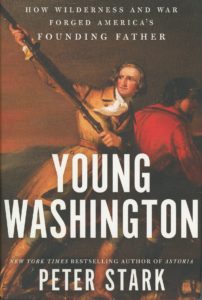
Much of what anyone can remember about George Washington comes from catchy rhymes, songs and folktales, recited throughout early elementary school. These recollections are draped in the heroism and reverie one would expect from America’s first president.
Adventure writer, historian and Missoula resident Peter Stark’s new nonfiction work, Young Washington: How Wilderness and War Forged America’s Founding Father, however, uses descriptive eloquence to explore an obscure and less heroic portion of a forefather’s early life: his transition from a middle-class youth into an over-zealous soldier.
The book chronicles Washington’s life, following the death of his idolized older brother, his brief stint as a surveyor, and his triumphs and foibles in the burgeoning British army. Stark’s no-holds-barred telling acknowledges Washington’s many errors of arrogance, ambition, inexperience and confusion, especially in his rifts with the French over control of the Ohio River Valley.
Conversely though, he asserts that these failures ultimately laid the political and social ground for the American Revolution; and that each struggle Washington underwent prepared him, and the country, for his role in gaining its freedom. More than this though, Stark’s exhaustive historical research explains the complex contexts of the class system, family dynamics, and Native American interactions during early westward expansion.
Young Washington’s greatest success is its powerful use of description. “… Striding in breeches and boots beside his column of men, most of whom wore crude leather shoes. They grunt and haul, while he – young, athletic, tall, powerful – perhaps lends a hand at crucial moments, leaning his powerful frame into the spoke of a wagon wheel or taking a turn on the ropes to heave the guns up and over a large boulder.”
The author brings readers into a critical moment of Washington’s development as a leader, one in which he broke ranks, helping his men in ways many others of his time might not have. Further, Stark illustrates the blossoming moral strength that is now synonymous with one of our Founding Fathers.
The ultimate message of the book is deeply human: despite his eventual appearance on a highly public stage, George Washington was a young man coming of age like any other, suffering the blows to his pride, discontent and naiveté, until he was strengthened by experience, emerging victorious into adulthood.
Fueled with powerful prose, the author of Astoria has crafted a worthy read for everyone from history buffs to those who have ever failed, only to succeed.
– Brynn Cadigan